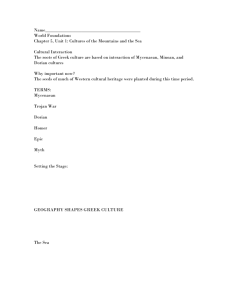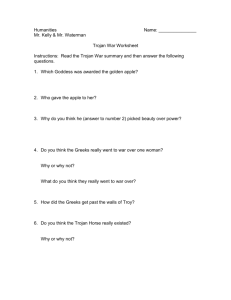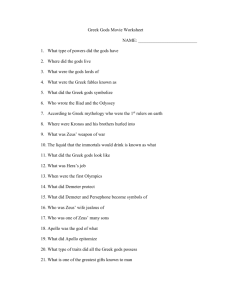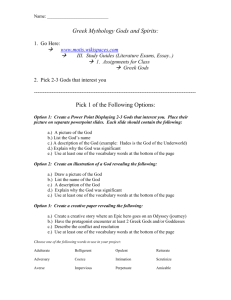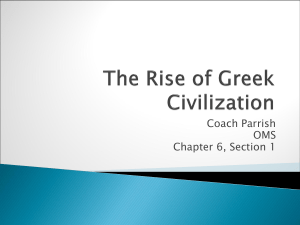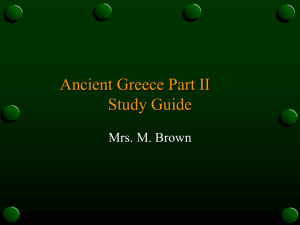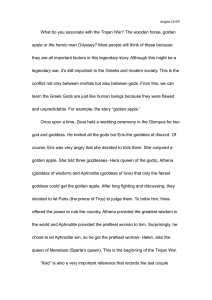Greek Government and Society
advertisement
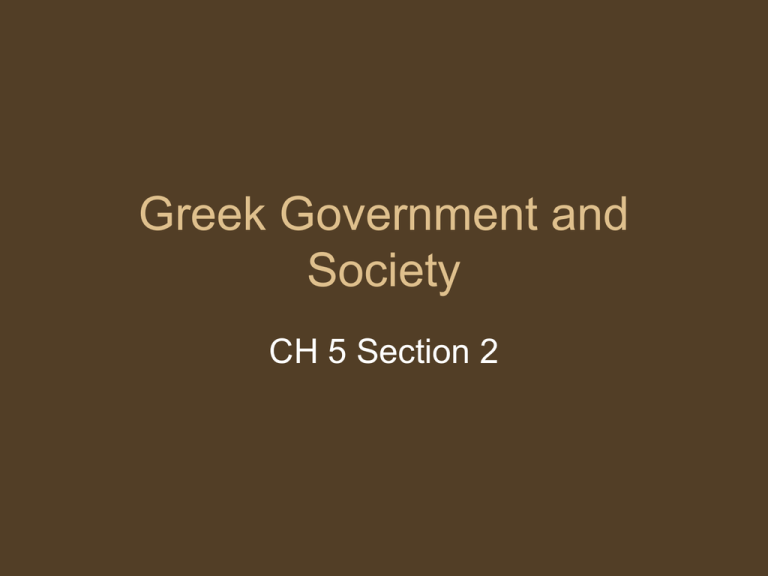
Greek Government and
Society
CH 5 Section 2
Some review
• Who were the earliest known Greeks?
• Who defeated the earliest known Greeks?
• Who lived on the island of Crete and had
to develop sea trade?
The Homeric age
• The Iliad and Odyssey
are gathered together
and written down around
700 BCE
• The Stories are credited
to Homer, No Not that
Homer!
• A blind poet
• Has anyone read them?
• The truth is that no one knows who wrote the
poems
• {The Iliad tells the story of the Trojan War}
• Helen of Troy, the wife of a Mycenaean king,
runs off with Paris (not Hilton), a Trojan prince,
back to Troy
• This leads to 10 years of war filled with some of
the greatest battle scenes in the movies to that
time.
• Achilles shows looking like Brad Pitt
• He is supposedly invincible except his Achilles
heel and of coarse that is where he gets shot by
Paris (not Hilton)
• So this Siege of Troy lasts a long time and the
Mycenaean's decide to give up when they can’t
get into the walls of the city
• But First they are going to leave a gift for the
City of Troy no strings attached
• The Mycenaean's gather up all the wood they
can find and build a giant horse and wheel it to
the door of the city
• The people of Troy see the Gift and think
• “We do deserve a giant horse for our trouble.
Maybe those Mycenaean's aren't so bad after
all. Drag that thing inside.”
• but they bring more than they think in with them
• After everyone passes out the troops hiding
inside jump out, open the gates, and kill
everyone
• This is the story of the Trojan Horse
• The battle of Troy actually happened the ruins of
the city have been unearthed and there is a
picture on the next slide
• The Odyssey is about Odysseus and his trip
home from the Trojan war
• It takes him 10 years to get to Ithaca (home)
cause the Gods are working against him, they
send him off course and wreck him on islands
• He does eventually make it home to find a
number of suitors trying to take his wife
• He kills them all
Greek Religious Beliefs
• The Greek religion did not expect personal morality like
other religions of the time
• Instead they looked at religion for three things
– To Explain Nature, the cause of lightning, thunder, the
seasons
– To explain emotions that caused people to lose self
control
– They thought religion could bring them benefits here
and now like long life
{NOT a preparation for the afterlife or salvation from
sin}
Religion
• The Greeks created Myths or traditional
stories about gods, goddesses, or heroes
• The gods had human qualities and
personalities
• The gods were believed to live on Mt
Olympus in North Greece
Zeus
• King of the Gods
• Had a daughter and
son
• {The Olympic games
were held every 4
years in honor of him}
Athena
• Daughter of Zeus
• Protector of wisdom
and womanly
goodness
• Athens was named
for her
Apollo
• Son of Zeus
• God of light, music,
and poetry
Dionysus
• Greek god of fertility
and wine
Religion Continued
• The Greeks believed that the gods spoke to
them through oracles and would travel to these
oracles to ask questions about the future
• They tried to please the gods through sow of
strength and bravery in athletic contests
• The most important of these contests were the
Olympic games held every four years to honor
Zeus held the fist time in 776 BC
• Originally only men could compete in or watch
the games
• Competitions included boxing, wrestling, and
foot races
Greek Government: From Kings to
Democracy
• City-States were originally small kingdoms ruled
by warrior chieftains from a hilltop fortress
• Wealthy land owners were asked to support their
rule and form their armies
• Land owners were the only ones who could
afford horses, chariots, and bronze weapons
• Over time the small group of land owners,
known as aristocrats, or “best men” in Greek,
• Nobles started to gain more land and power in
Greece
• by 700 BC they had overthrown their kings and
taken power
{Aristocracies
• Originally the word aristocracy meant “ruled by
the best”}
• Over time it became the word for the privileged
upper class
• {These aristocracies are groups of nobles that
came to rule the Greek city-states}
• They held a monopoly over the military and
controlled the economy
• {They even held control over religion}
• They acted as judges, determining the citystates laws and punishments
Hoplite
• A new form of infantry that carried long spears
they fought in closely spaced rows
• This was a non aristocratic soldier that
demanded more say in Govt.
• The chariots and cavalry of the aristocrats were
no match for the Hoplites formations
• The soldiers in 300 are similar but the real ones
wore armor
Tyrant
• {Someone who illegally took power but had the
peoples support}
• Between 650 and 500 BC tyrants ruled many
Greek city-states
• They ended the nobles fight for power and
promoted trade
• At first they rule well but in some cases they
become unjust
• Tyrant now means someone who uses absolute
power brutally
Popular Government
• The city-states would take power back from the
tyrants and the idea of popular government took
root
• This idea that the people could and should rule
themselves
• Democracy or government in which the citizens
take part developed in places like Athens.
• Full rights were only allowed to free men
• Women and slaves had no political rights
• Other city-states like Sparta maintained kings or
went back to the aristocratic government
Section Review
• What book tells the story of the Trojan
war?
• The Olympic games were held every 4
years in honor of who?
• Aristocracy originally means ______ __
___ _____.
• Someone who took power but had the
peoples support?
The End?
